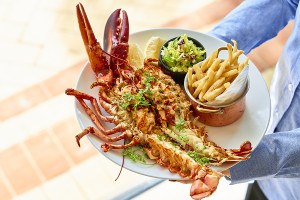Dining Out: Bistro du Midi

Photograph by Keller + Keller
There are four basic rules for dining at Bistro du Midi: 1) Order fish. 2) Have the warm chocolate fondant for dessert. 3) Save room for the complimentary jar of nougat squares that arrives at the end of your meal. 4) Make sure everyone in your party shows up on time (they’re strict about seating groups in full). Follow all of these, and you’re likely to leave happy.
In fact, Bistro du Midi just might break what I’ll call the “Biba curse.” Over the past several years, the restaurant space in the posh Heritage on the Garden building — despite having practically the prettiest views in town — has come to be synonymous with expensive defeat. Ever since Lydia Shire’s legendary Biba, with its tandoor oven, bold design, and limitless salt and butter, closed in 2002, the Heritage hasn’t recovered. After Excelsior failed in two fully realized incarnations, I thought nothing else could succeed there.
But restaurateur Kenneth Himmel, who created Excelsior, has had too many successful restaurants to cry uncle for long. (His other Boston spots are Grill 23, Harvest, and the new Post 390.) So now he’s joined up with Marlon Abela Restaurant Corporation, the force behind a string of London restaurants and two A Voce restaurants in New York, and the new partners have taken a spare-no-expense approach to creating a Provençal restaurant.
The early crowds at Bistro du Midi imply a lifting curse, and a fair bit of the food and service makes me see why. Not the décor, though — truth be told, with every redesign the space has gotten uglier. Bistro du Midi’s interior is strangely stodgy, as if following a brown and cream Mistral template with wrought-iron fixtures and rich woods. It looks like a hotelier’s idea of bland, safe taste, and the hard tiles, plaster walls, and low ceiling make for awful noise. If ambiance is what you’re after, the bar downstairs might be a better choice.
The menu reflects the restaurant’s namesake, the Midi region of France, which includes Provence and the Côte d’Azur and is known for its seafood. I was knocked out by the bistro’s fish dishes, which were so expert that I was puzzled why so many nonfish dishes were blah. The fish mastery makes sense: Executive chef Robert Sisca was formerly executive sous chef at Le Bernardin in Manhattan. He trained at Johnson & Wales and worked in New England, and now he’s back. Follow him wherever he’s cooking fish.
Interestingly, Bistro du Midi features mostly Mediterranean, not New England, fish. The English owners, who sent the chef on a speed-eating tour of Provence last August, decided to import a slew of Mediterranean fish every day (much of it from the exemplary Browne Trading Company, just up the coast in Portland and one of the country’s best purveyors). So Sisca serves the first truly Provençal bouillabaisse ($27) I can remember having in Boston. It’s got the right Pernod-and-fennel-flavored broth with a literal backbone of fish, and the dish’s proportions show authentic Provençal frugality: Served in the appropriate quantity, bouillabaisse broth is somewhere between a sauce and a soup. Sisca’s version also has a huge amount of perfectly seared fish fillets on top. It’s a real luxury, and worth the price. Sisca throws New England a bone by occasionally offering a shellfish variation with mussels, clams, calamari, and prawns. The broth is much thinner and less interesting than in the classic; it’s a seafood stew, not a bouillabaisse, but still a good one.
Sea bass, one of the Mediterranean imports (it’s loup de mer, not the familiar striper), is stellar as a grilled entrée ($24) with similar fennel and Pernod flavorings, plus citrus and more-aggressive herbs like rosemary and thyme in a “virgin sauce.” Neat name, no? Sauce vierge, more or less a vinaigrette, became popular with 1970s cuisine minceur and was taken up by Sisca’s Le Bernardin boss, Eric Ripert. Sisca adds fresh lemon and orange segments; the citrus flesh seductively flecks the richly flavored bass.
I’d like to say that Sisca got the south of France on his whirlwind tour the way he got fish at Le Bernardin. But I didn’t see as much evidence as I’d hoped to. He’s enthusiastic about charcuterie, and better at it than he is at the meat entrées. Fillet of beef ($28) was positively anemic, and not much helped by a wan sauce. Venison tenderloin with quince, root vegetables, and chestnuts, a promising-sounding dish, tasted like cardboard, and the quince was inedibly hard and undercooked. Venison can be a red-meat revelation, but this was a disappointment (and at $32, an expensive one).
The appetizers were surprisingly variable, with two dud versions of Mediterranean standbys: an oily pissaladière ($11) with a thin, soggy crust and undercaramelized onions, and an unimpressive salad niçoise ($15). The salad’s house-confit tuna had almost no flavor; opening a can would have been so much better, and cheaper. But braised octopus ($11) with a garlicky, herby marinade seemed expert and fresh, with eggplant caviar and sun-dried tomatoes lending real Provençal flavor. Dried tomatoes in a butter sauce gave the same Provençal hint to meaty prawns ($17). And chestnut soup ($8) showed a kind of French mastery that would be the envy of any cook. Why didn’t everything else? It’s baffling unevenness from a promising cook who’s been given an enviable chance to make his name.
One of the restaurant’s luxuries is having a dedicated pastry chef — a rising star from New York named Sarah Ewald, straight from Eleven Madison Park. She’s got a talent for nougat, a Mediterranean sweet that’s hard to make fresh, requiring the right combination of syrup, egg whites, and nuts. She makes both white and chocolate versions, wraps them in cellophane, seals them in a jar, and sends them to the table after dessert. Boston’s finest are opening their purses and emptying out those jars before they go home. These could be the new macarons.
Ewald is also excellent (as this magazine noted last month) at a molten chocolate cake ($8) that, living up to the ecstatic promises of the maitre d’, erupts with chocolate. (Ignore the request from the waiter at the beginning of the meal to preorder a soufflé: The chocolate one ($10) is a drier, duller, barely puffy version of the cake, and tastes as if it was made in advance.) And the nougat ice cream that comes with the molten cake is even better. Sisca told me that repeat customers from the Four Seasons come in asking for a dish of that alone. I understood: It’s easy to get a jones for. I’ll be back for bouillabaisse. And with empty jacket pockets waiting to be stuffed with after-dinner treats. 272 Boylston St., Boston, 617-426-7878, bistrodumidi.com.
Bistro du Midi, 272 Boylston St., Boston, 617-426-7878, bistrodumidi.com.


